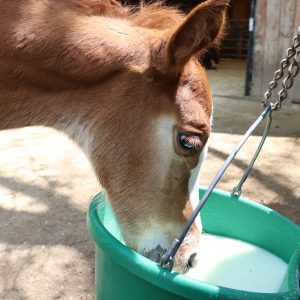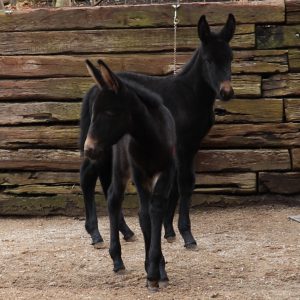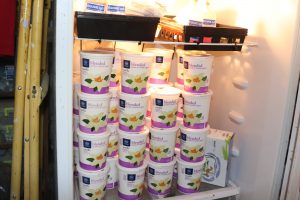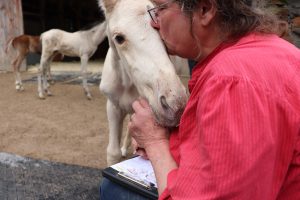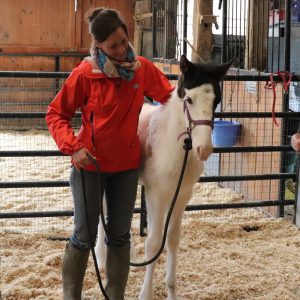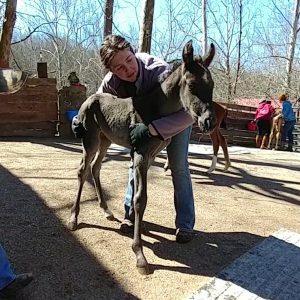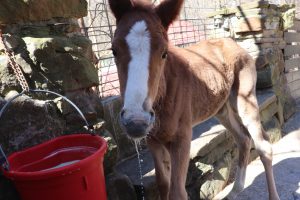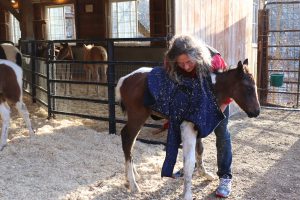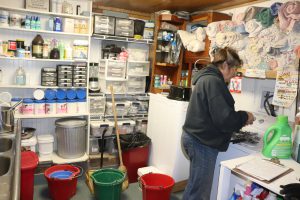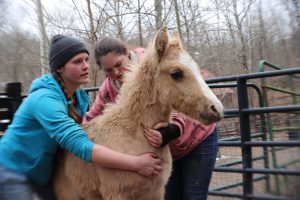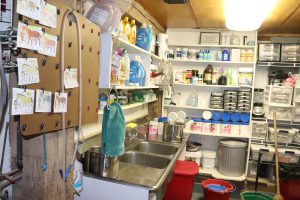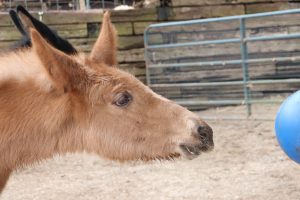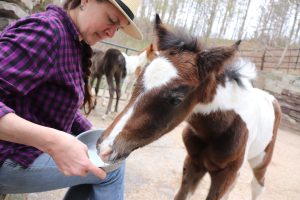Bringing babies home
What to do when you get home.
The process of raising an orphan foal should be one of using your common sense. It should be as simple and natural as raising a child; which we know can be anything but! DON'T PANIC!
Your foal is an individual, the trials and tribulations that you experience will be your own and you may need help. That is why we tell everyone that adopts one of our hooved Bundles of Joy---start a working dialogue with your vet . Make sure that he/she is an equine vet or has experience working with horses and foals--- many may not. Bring him/her up to speed on the endeavor that you have undertaken so that your questions and concerns do not come out of the blue. Have your vet already tuned in and prepared to help you BEFORE you adopt your foal, you have already started this conversation when you asked them to email us. Now you need to let them know that you have them at home and there current condition just to make them aware.
Remember that twenty years ago raising an orphan foal was uncommon. Most horsemen and vets alike assumed that the foal would not survive without its mother. The foals would often die from the very issues that still trouble them. Today, however, armed with new products and information – the times are changing. Many vets still are not aware of the new products and information now available or of the great success we and many others have experienced. A great assembly of articles is currently available on the internet at sites like TheHorse.com and HorseAdvice.com. We recommend that you join one of these sites; they are like the WebMD but for horses. Here are some basics:
Your foal should have a draft free environment and as much human and equine company as possible. They must have plenty of room to run and play in the sunshine, inside of safe fencing that they will not become tangled in, slip under or be cut on. Woven wire or board fencing is recommended. Everything that happens at these early stages will be the key to whether your foal is happy and well adjusted or is becoming maladjusted and out of control.
Feed and Feeding
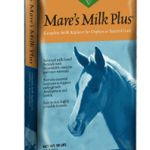 Rule Number One - Food must be going in and coming out on a regular basis. Pay attention this is your first and sometimes only clue that something could be wrong.
Rule Number One - Food must be going in and coming out on a regular basis. Pay attention this is your first and sometimes only clue that something could be wrong.
When you adopt a foal from us, you can buy a bag of milk per baby to get you started until you can buy some of your own. We highly recommend Buckeye's Mare's Milk Plus. It is expensive, as all milk is, but it is better for your foals in the long run. You must find a supplier before getting babies. Remember: Quality in means quality out.
Your foal should be bucket feeding when it leaves here but if not this should be your first goal otherwise you will be training your foal twice. You should make milk pellets and hay available early on and watch their intake- increasing milk pellets as necessary. Once your foal is feeding regularly and finishing what he/she is offered the amount should be increased. There should be milk available at all times and the bucket should be cleaned between feedings. At around 3-4 weeks you should be able to leave an overnight feeding in good conscience.
Remember that whenever you change the flavor of their feed they are likely to stop eating, so don't go switching your milk replacer willy nilly or you will have a very hungry foal on your hands. We add Vanilla flavored Yogurt (live active culture) and a product made by Uckele called G.U.T. to each batch of milk that I make. We put a large container of yogurt in each regular bucket (20 qt) of milk.
Milk should be always available this way foals can drink whenever they want to, these seems to be more natural for the foals. When a foal is with its mother the it might nurse in small amounts every ten minutes or so. I find that if I only feed them every 2-3 hours or so they tend to gorge themselves and can end up with colic or with diarrhea. Your milk should be replaced and buckets washed every 6 hours. On cool nights you can leave the milk out overnight. You will soon learn the proper amount to make so that you are neither underfeeding nor wasting milk, use common sense. The cooler it is, the longer the milk keeps. In the sun or on a hot day, a bucket of milk might only last an hour or so, but on a cool day, it might last 3-4 hours. It depends. If your foal that is normally drinking well isn't drinking, check to make sure that the milk is not bad.
The day they arrive, they nibble on hay and grain. The older they get, the more they eat. By the time they are 8 weeks old the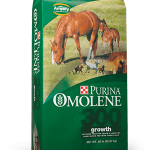 majority of their diet will be hay and grain. They can have unlimited grain until they start making a career out of chomping it down the second you put it in the bucket. Usually this is around 8-10 weeks. After that, grain 2-3 times a day is best instead of free-choice. High quality hay still remains free choice for the rest of their lives. We feed a high quality soft grass hay. A little alfalfa isn’t a bad thing; they just often don’t like the rough texture as much until they get a bit older. The grain we feed them is Omolene 300 which is made by Purina.
majority of their diet will be hay and grain. They can have unlimited grain until they start making a career out of chomping it down the second you put it in the bucket. Usually this is around 8-10 weeks. After that, grain 2-3 times a day is best instead of free-choice. High quality hay still remains free choice for the rest of their lives. We feed a high quality soft grass hay. A little alfalfa isn’t a bad thing; they just often don’t like the rough texture as much until they get a bit older. The grain we feed them is Omolene 300 which is made by Purina.
Diarrhea
Your foal WILL get diarrhea- DON'T PANIC! This is natural and may be short lived but chances are it may seem persistent. There are many cures out there, be they wives tales or based in modern science. You may have to use a little trial and error. A cup of plain or Vanilla yogurt in each feeding definitely helps to regulate the flora and fauna in the digestive system as well as adding solids to the diet.
Most foals experience extreme diarrhea when they are around 9 or 10 days old. This foal heat diarrhea was in the past thought to be caused by the hormone provided by the mare and passed to the foal via her milk. Current thinking says that this is simply the digestive system going through normal changes. (Foals without mothers often go through the same process in the same timely fashion as those with mothers.) This foal heat diarrhea should not be confused with a more persistent and dangerous variety of diarrhea. Because the foal does not have a mare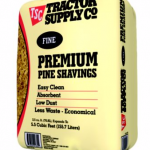 to suckle, he will suck on any and everything - sometimes ingesting fecal matter and or anything else that his mussel can touch. Ecoli, salmonella and Rota Virus to name a few can destroy a foal in a relatively short time. Once again consult your veterinarian if the diarrhea persists or is projectile or extremely watery. The most important thing that you can do is provide a clean environment. Clean bedding at least once a day, wash your foals behind at least once a day. This daily bathing is actually part of the foals first "training". Wash the surfaces in his stall – anything he can touch, and clean, really clean the buckets every day. I wash my buckets with an antibacterial soap between each serving of milk – as well as all utensils used.
to suckle, he will suck on any and everything - sometimes ingesting fecal matter and or anything else that his mussel can touch. Ecoli, salmonella and Rota Virus to name a few can destroy a foal in a relatively short time. Once again consult your veterinarian if the diarrhea persists or is projectile or extremely watery. The most important thing that you can do is provide a clean environment. Clean bedding at least once a day, wash your foals behind at least once a day. This daily bathing is actually part of the foals first "training". Wash the surfaces in his stall – anything he can touch, and clean, really clean the buckets every day. I wash my buckets with an antibacterial soap between each serving of milk – as well as all utensils used.
You can use just about anything on your foal that you can use on yourself, kaopectate, Imodine AD, ect. DON'T PANIC – adjust your thinking cap and get that diarrhea under control. A slurry of yogurt and activated charcoal force fed to your foal might help slow him down – consult your vet. Electrolytes in the milk may help as will other items to absorb the toxins and or balance the digestive system. Is your foal running a temperature? The normal range is between 99 and 100 degrees. If your foal is running a temperature then this could indicate an infection. Your vet may recommend that you use an oral antibiotic or inter muscular injection, which he or she could provide. Another big cause of diarrhea in foals can be ulcers. Research suggests that as many as 80% of foals develop ulcers and that these can kill a foal in a few short days, watch for kicking at the stomach, grinding of teeth, chewing wood and general discomfort. I give all of my foals medication for ulcers everyday of the first two weeks. Zantac, 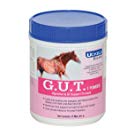 Tagamet, or any of the other over the counter ulcer medications will be most helpful and appreciated by your foal. I also add a scoop of Uckele "G.U.T." to each bucket of milk for added ulcer prevention and the foals seem to really like the added taste. As you can tell diarrhea is the most likely problem that you will encounter and the most popular complaint that we field. But let us not forget about the other side of the coin, CONSTIPATION. As I said earlier the main rule of thumb is “Food must be going in and coming out on a regular basis.” Constipation can cause as devastating results as diarrhea if it is left unattended. If your foal hasn't had a bowel movement today and if he is showing signs of discomfort or colic rolling, stomach kicking or biting call your vet. Once again, for simple constipation you can use those same tried and true remedies that your family has enjoyed for years milk of magnesia, mineral oil, enemas (I use the fleet saline on my foals), ETC. If the condition persists, the foal may have a blockage and will need to see a vet immediately.
Tagamet, or any of the other over the counter ulcer medications will be most helpful and appreciated by your foal. I also add a scoop of Uckele "G.U.T." to each bucket of milk for added ulcer prevention and the foals seem to really like the added taste. As you can tell diarrhea is the most likely problem that you will encounter and the most popular complaint that we field. But let us not forget about the other side of the coin, CONSTIPATION. As I said earlier the main rule of thumb is “Food must be going in and coming out on a regular basis.” Constipation can cause as devastating results as diarrhea if it is left unattended. If your foal hasn't had a bowel movement today and if he is showing signs of discomfort or colic rolling, stomach kicking or biting call your vet. Once again, for simple constipation you can use those same tried and true remedies that your family has enjoyed for years milk of magnesia, mineral oil, enemas (I use the fleet saline on my foals), ETC. If the condition persists, the foal may have a blockage and will need to see a vet immediately.
⊕ If, when you enter the stall, your foal doesn't get up bright eyed and bushy tailed, you may want to check his/her temperature. It should be 99-100. If their temp is off, they have glassy eyes, or a runny nose- you should call your vet. Not tomorrow- NOW. Hours can make all the difference in a young life. ⊕
Training
Spend as much time as is possible with practical handling [gentling] picking feet up, etc. DO NOT attempt to tie your foal anywhere! It can not be tied in the trailer or stall, etc. until it has been taught to lead WELL. To do this you attach a lead to the halter, as usual, and wrap the lead around the foals back end by making a figure eight with the lead rope over his back. You now try to get them to lead by pulling on the lead at halter and pulling from behind at the same time. This is a simple process and they should be leading within a few days. Remember to keep control; DO NOT allow the foal to flip over. Injuries occur very easily this way which, again, is why they can not be tied. You do not want a battle on your hands. If you are controlling the foal's head and butt at the same time you can avoid a great deal of trauma while learning that all important skill of leading. Your foal will also need a lot of exercise! This is an absolute necessity for strengthening tendons, muscles and overall health. Exercising is best done in the company of other equine, but use a safe partner that will not injure your foal. The older horse will teach your foal how to be a proper horse. Socialization is very important and should happen like exercise on a daily basis. The foals do better when adopted with a partner. They need the constant contact and love, since they can't have their mothers with them another foal is a warm substitute. You should try to do as many things now as you will be doing with the foal when it gets older. Of course like a child a foal has a limited attention span, but at around 1 month I start to take mine on walks, small trail rides, if you will, including walking in and around water, stepping over obstacles, entering and exiting trailers. I also teach them to stand in cross-ties, only under very safe circumstances – generally in a stall. I pick up their feet, use hair clippers on them, and leg wraps. This way by the time your foal is a two year old everything will be old hat. Remember slow and steady wins the race…use small amounts of this kind of training but do it consistently. Follow your instincts, these basic rules and you will have a friend for life! Victoria
NOTICE:We WILL NOT load a foal into a substandard trailer. Your trailer must be fully enclosed, no half back doors. If your trailer has half back doors you must modify it with solid top doors before coming for your foal. Be creative... Think plywood, etc.If I can't hit the floor of your trailer with a sledge hammer and not break it, you can't put a foal in it, it doesn't matter how far you have driven to pick up your foal, we will not put a foal in danger, the safety and well being of our foals is of a paramount concern to the L.C.C.
Why we don't hold foals: Our policy is that of "First Come First Serve" to qualified homes. In the past holding a foal for adoption has not proven to be a good idea. We must recycle the space we have available as well as the funds to purchase more foals. Our goal is to place as many foals as possible into loving homes. If I hold 2-3 foals for a week that could mean the lives of as many as 6 to 7 other foals. Call us when you are FULLY prepared to adopt. This does not mean that you are ready when all you have to do is "set up another stall", etc. We apologize if this is inconvenient, but then again the safety and well being of as many foals as we can place is our primary concern.
Recap
Open conversations with your Vet, maybe get a wellness check for introduction.
Safe environment where little legs cannot get stuck, out of the weather.
Enough room to run.
Clean bedding, buckets and bums.
Quality food in, quality life out.
Training should be fun! Not forced.
Socialize with other horses - use caution they can be hurt.

